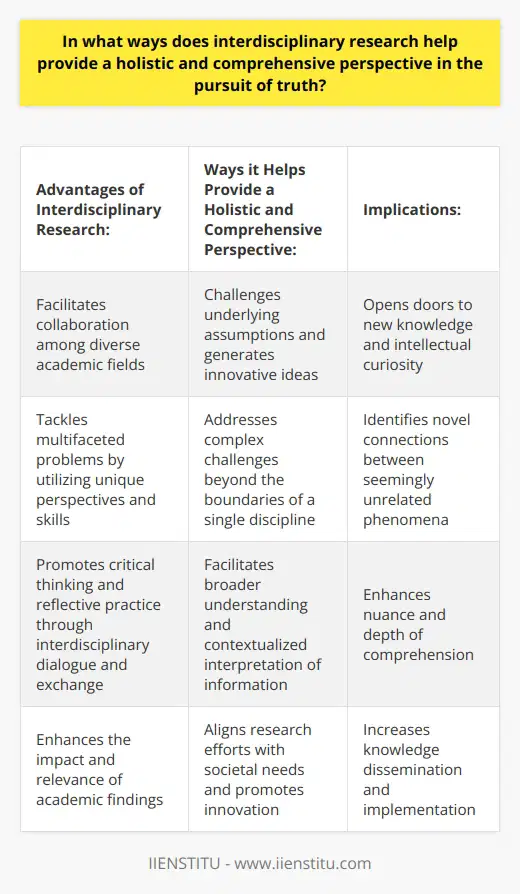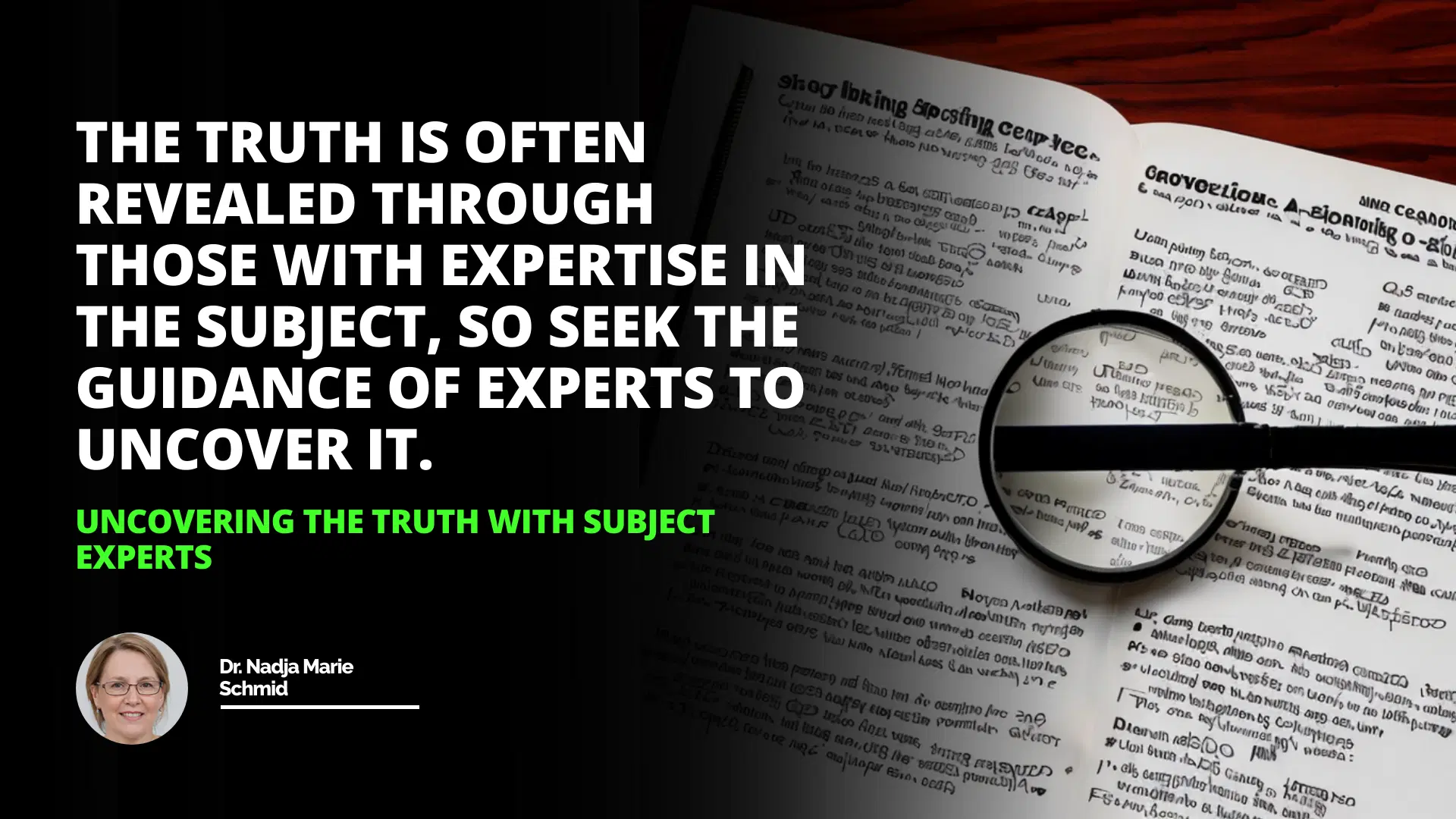
What is its Role in Uncovering the Truth?
Benefits of Subject Experts
Overview of Subject Expertise in the Research Process
Practical Application of Subject Expertise
Subject expertise is the application of specialized knowledge to a particular subject area. Sub-specialties may require a comprehensive understanding of a subject, thus requiring an individual to draw on various disciplines. Subject expertise is essential in many fields, ranging from medical research to political science, and is often crucial to uncovering the truth.
What is its Role in Uncovering the Truth?
In investigative journalism and other research projects, subject expertise is invaluable. Individual researchers and journalists can benefit from having subject expertise to help them identify sources, analyze evidence, and develop hypotheses. This can help uncover facts essential to understanding an issue's greater context while minimizing bias and misinformation. Additionally, subject expertise can help create new ways of approaching a topic and provide fresh and innovative perspectives.
Benefits of Subject Experts
Subject experts are generally reliable sources of evidence because of their deep understanding and expertise of a particular topic. As a result, they can provide accurate and authoritative opinions on a subject and offer a complete experience of an issue. Additionally, subject experts often have access to specialized resources, such as databases, that are unavailable to the general public. This allows them to provide the most up-to-date information on the topic.
How do Subject Experts Increase Efficiency and Accuracy?
Subject experts can increase efficiency and accuracy in research by narrowing the search criteria and providing accurate and detailed feedback on resources. This can help researchers identify relevant sources more effectively and quickly. It also helps to limit mistakes made while researching a topic. For example, suppose a researcher has subject expertise in medical research. In that case, they can soon review whether a source is reliable and relevant.
Overview of Subject Expertise in the Research Process
Unlocking Niches: Divisional Structure for Successful Corporations
The Most Important Key to Leadership Success: Emotional Energy Management
Researchers can utilize subject experts in a variety of ways. For example, they can be consulted on the direction of a project, provide advice on resources and theories, and offer feedback and critique on drafts of research papers. Additionally, subject experts can guide ethical considerations and provide insights into an issue's cultural and historical implications.
What Types of Research Benefit from Subject Experts?
All research projects can benefit from subject experts, from in-depth academic papers to short opinion pieces. Subject expertise can help ensure that research is conducted ethically and that reliable sources are used. Additionally, subject experts can help uncover hidden or obscure facts or clarify concepts that are not easily understood.
Practical Application of Subject Expertise
Identifying the most suitable experts in the field when utilizing subject experts is essential. For example, an article on health care policy might require a subject expert in public policy. In contrast, a report on the history of the American West might need an expert in US History. Considering the expert's experience and qualifications in the subject area is also essential.
Integrating Subject Expertise into the Research Process
Subject expertise can be integrated into the research process in several ways, such as by holding informational interviews with experts in the field or reading academic research articles. Additionally, subject expertise can be used in the form of data or evidence-based research to support the findings of a particular project.
Conclusion: Subject expertise is an essential element of any research project, as it can help to ensure that the research is conducted ethically and accurately and that the conclusions are backed up by reliable evidence. Additionally, subject expertise can provide fresh perspectives, uncover hidden facts, and offer insights into the implications and consequences of a particular topic.
When looking for subject experts for a particular project, it helps to think carefully about which type of expert is best suited for the task. Additionally, it is essential to consider the qualifications and experience of the expert on the topic. Professional organizations, web databases, and networking within one's field can help find suitable subject experts.
The truth is often revealed through those with expertise in the subject, so seek the guidance of experts to uncover it.
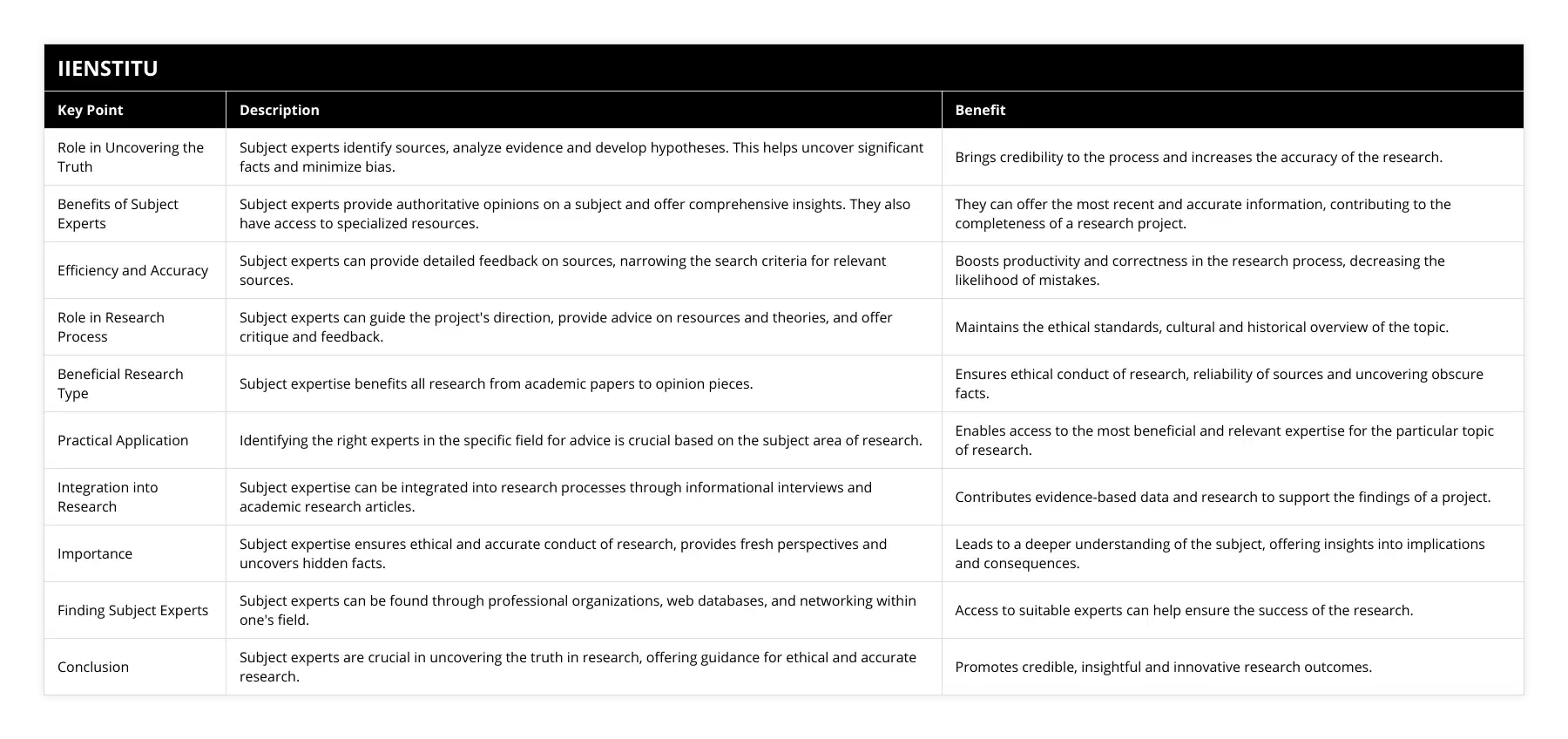
Frequently Asked Questions
What strategies and techniques can be used to determine the accuracy of claims by subject experts?
As people become more connected in an increasingly globalized world, assessing the accuracy of claims made by subject experts is essential. This is particularly important when the claims directly impact individuals' health and well-being. Engaging in proper research and using suitable strategies and techniques makes it possible to determine the accuracy of claims from subject experts.
One approach to verifying the validity of claims from subject experts is to conduct a science-based evaluation. This usually involves a research process involving both primary and secondary sources. Primary sources collect original research data, sometimes through direct observation or data collection. In contrast, secondary sources typically analyze existing data or literature. Examining the primary and secondary sources ensures that the results are replicated, and the validity of the claims can be verified.
In addition to the science-based approach, it is also necessary to use strategies and techniques to discern whether or not the claims from subject experts are accurate. One way to do this is to compare the facts and results of similar claims made by different experts. If the two sets of claims contradict each other, more research must be done to determine which one is valid. Additionally, fact-checking websites can be used to cross-check assertions, verifying their accuracy by referencing reliable sources and the accuracy of the facts in question.
Subject experts are often privy to information that can be difficult to access, making it critical to discern if their claims are accurate. By utilizing available research tools and strategies, it is possible to ascertain the accuracy of any claims. For example, a science-based evaluation approach helps verify the shares' validity with reliable data. At the same time, comparison and fact-checking techniques can be used as supplementary techniques to ensure accuracy. Implementing such strategies not only helps to ensure the accuracy of claims but provides an additional level of assurance for individuals looking to benefit from the advice of experts.
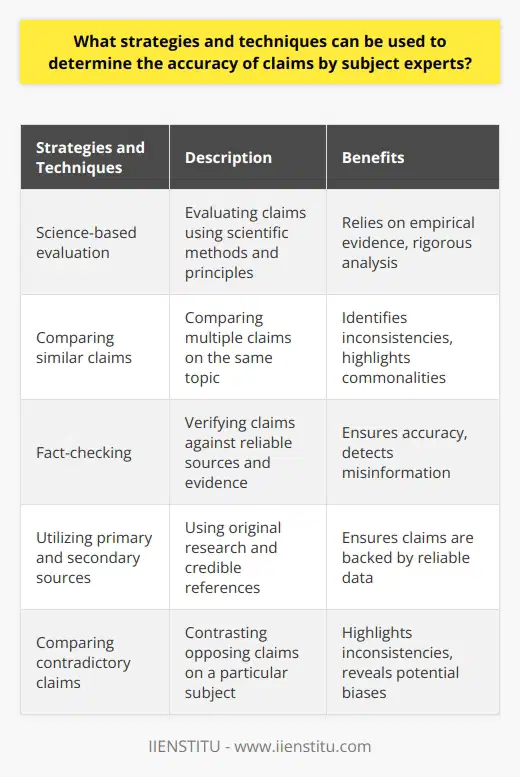
What evidence and sources can be used to uncover the truth in complex or controversial topics?
A key component of uncovering the truth in complex or controversial topics is the ability to access accurate evidence and reliable sources. In addition, to find the truth, individuals must have access to a range of perspectives and have a thorough understanding of the context and history of the topic.
One way to uncover the truth is to use primary sources as evidence. Primary sources provide direct or firsthand evidence, including letters, speeches, photographs, or interviews. This can often be used to authenticate facts or provide insight into personal and historical experiences pertinent to the topic.
Secondary sources are another type of evidence that can be used to uncover the truth in complex or controversial topics. These sources provide interpretations of primary sources by scholars and can provide a more comprehensive picture of an issue. Books and journal articles are frequently used secondary sources.
In addition to primary and secondary sources, interviews with experts can provide reliable evidence when uncovering the truth. Interviews are an essential source of information and allow individuals to hear firsthand accounts of an event or situation. They can also provide evidence not initially available through primary or secondary sources.
Finally, another important source for uncovering the truth is anecdotal evidence. This type of evidence relies on personal accounts or experiences, often providing highly reliable evidence when no other primary, secondary, or expert sources are available. Anecdotal evidence can also allow individuals to gain a deeper understanding of a topic and provide a much-needed personal perspective.
In conclusion, uncovering the truth in complex or controversial topics requires access to reliable sources and evidence. Primary, secondary, expert, and anecdotal sources are all important sources of evidence that can be used to uncover the truth. In addition, these sources provide a holistic view of the topic and allow individuals to understand the truth comprehensively.
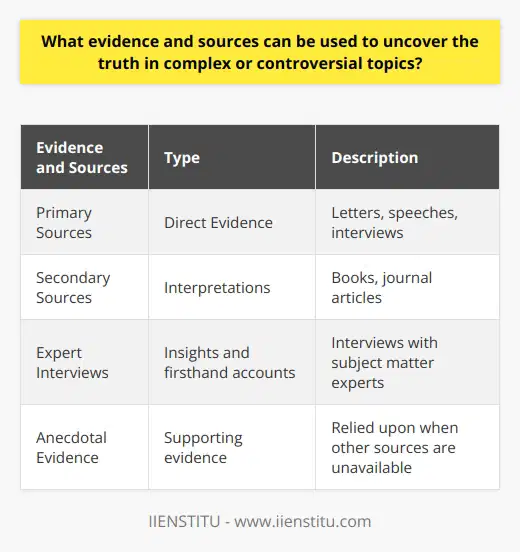
How can a critical examination of the facts and sources be used to ensure a fair and objective assessment of a subject expert's claim?
An objective and reliable assessment of a subject expert’s claim is fundamental to any discourse on any subject. An effective way to conduct such an assessment is to examine the facts and sources behind the claim critically.
The critical examination must strive to clearly understand the relevancy of the sources utilized and the reliability of the facts received from the start. This is important to ensure that the claim made by the subject expert is well-founded and holds up to proper scrutiny. The process of critical examination begins by assessing the reliability of the sources utilized. This involves evaluations such as examining the credentials of the head and the currency of the source’s information. Furthermore, it consists in evaluating how well the source’s facts fit into the overall context of the claim. By scrutinizing the sources’ information, it is possible to judge the validity of their facts and weigh them against alternate sources with different frames of reference.
Likewise, the information on which the claim is based should also be critiqued. Facts should not be taken at face value. Instead, tAn independent source should verify them to convince any individual of their validity. Furthermore, the authenticity of the information should be assessed by carefully examining the origins and the context of the claim. This means considering any alternate interpretations or implications of the claim and scrutinizing the objects of the claim for any discrepancies or logical flaws.
Critical examination of facts and sources effectively ensures a fair and objective assessment of a subject expert’s claim. It helps to ensure that any claim from an expert holds up to scrutiny and that only reliable facts and sources are being utilized. This helps to create a reliable discourse platform and prevents inaccurate claims from influencing the public.
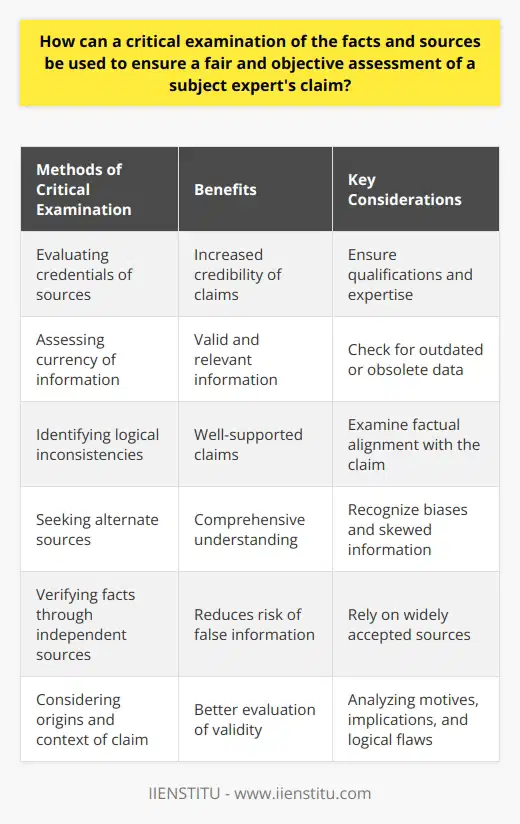
Why is uncovering the truth important in fostering intellectual growth and societal progress?
Significance of Discovering Truth
Uncovering the truth is vital in promoting intellectual growth and societal progress, as it provides an essential foundation for decision-making processes. Without a clear understanding of the truth, individuals cannot make informed decisions, resulting in stagnation in both personal and community development. Furthermore, understanding the truth is crucial for fostering a healthy intellectual environment, where discussions and debates can contribute to shared knowledge and collective decision-making.
Role of Truth in Intellectual Growth
Intellectual growth relies on individuals' ability to analyze, challenge, and understand various viewpoints and information. The pursuit of truth enhances critical thinking skills, as it encourages individuals to question existing information and search for underlying factors or hidden arguments. By engaging in this process, people can develop a nuanced understanding of problems and ultimately contribute to a more informed and advanced society.
Influence on Societal Progress
In addition to promoting personal intellectual growth, uncovering the truth is integral to societal progress. It enables the establishment of trust in institutions and processes, which is vital for the functioning of any community. The pursuit of truth encourages transparency, as it exposes flaws in the systems and highlights areas for potential improvement. Moreover, when truth is revealed, it can facilitate conflict resolution by providing an objective basis for discussions and agreements.
Implications for Education and Learning
The importance of uncovering truth is also evident when considering its role in education and learning. By fostering a culture of truth-seeking, educational institutions can facilitate critical thinking skills and independent thought among students, ultimately preparing them for effective participation in societal decision-making processes. Educational institutions should thus encourage students to engage in research, seek out primary sources, and interrogate the validity of the information they encounter, leading to intellectual growth and a society more capable of addressing complex challenges.
Conclusion
In conclusion, uncovering the truth is essential in facilitating intellectual growth and societal progress. It fosters critical thinking skills, enables trust in institutions and processes, and encourages transparency, while also playing a pivotal role in education and learning. By acknowledging the importance of truth and striving to uncover it in various aspects of life, individuals and society as a whole can make more informed decisions and ensure continued progress.
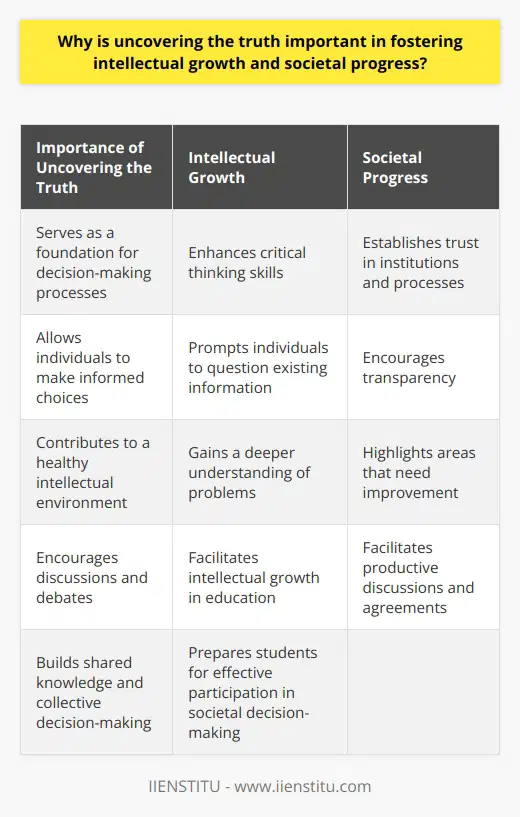
How does research contribute to developing a deeper understanding and more accurate representation of historical events?
Role of Research in Understanding History
Research plays a crucial role in developing a deeper understanding and more accurate representation of historical events. Conducting thorough research enables historians to find valuable primary and secondary sources, providing critical insights into past incidents. When historians uncover new evidence, they can reinterpret historical events and challenge prevailing narratives.
Analyzing Sources and Evidence
Primary sources, such as documents, artifacts, and accounts from the time, offer direct insights into the perspectives and experiences of people who lived through these events. Analyzing primary sources can reveal hidden dimensions of an event and allow historians to develop more accurate and nuanced interpretations. Secondary sources, which include scholarly analyses and contemporary discussions of historical events, also bring different perspectives and methodologies to bear on understanding the past.
Contextualizing Events and Narratives
Research helps contextualize historical events, situating them within broader political, social, and economic frameworks. By understanding the specific factors that shaped a particular event, historians can more effectively evaluate its impact and legacy. Developing comprehensive contextual knowledge also allows historians to recognize how events interconnect and influence each other, enriching our understanding of the broader historical tapestry.
Emphasizing Diverse Perspectives
A critical aspect of deepening our understanding of the past is acknowledging and exploring diverse perspectives. Research can lead historians to marginalized or previously underrepresented voices, offering new vantage points and challenging traditional narratives. Constructing more inclusive historical accounts not only enriches our understanding of the past but also fosters empathy and respect for different perspectives.
Engaging with Ongoing Debates
Research contributes to and is informed by ongoing scholarly debates about historical events and their interpretations. Engaging with these conversations allows historians to refine their perspectives, challenge conventional wisdom, and ultimately create a richer, more well-rounded understanding of history. This dynamic process of engagement and exploration ensures that our knowledge of the past is constantly evolving and improving.
In conclusion, research is indispensable in developing a deeper understanding and more accurate representation of historical events. By analyzing primary and secondary sources, contextualizing events, emphasizing diverse perspectives, and engaging with ongoing debates, historians continuously sharpen our collective comprehension of history. Research thus forms the foundation for the critical work of historians and the broader academic pursuit of understanding our past.
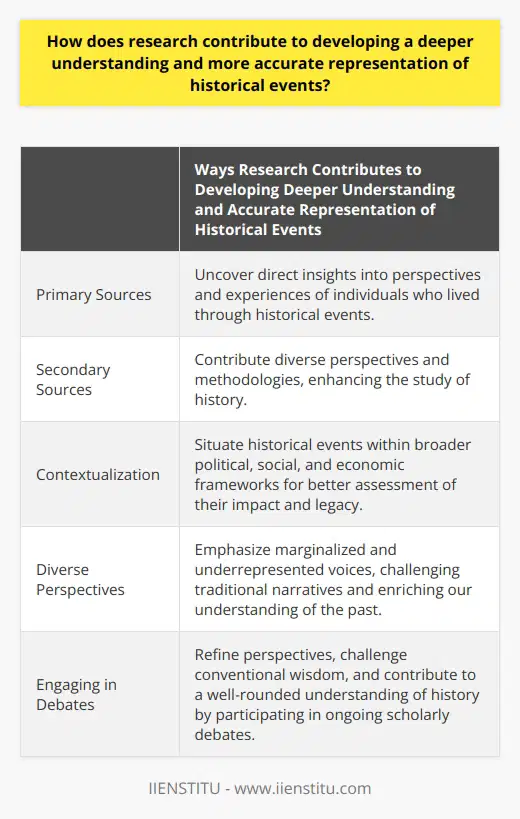
In what ways does interdisciplinary research help provide a holistic and comprehensive perspective in the pursuit of truth?
Interdisciplinary Approaches: The Key to Holistic Understanding
In the pursuit of truth, interdisciplinary research plays a pivotal role by offering a comprehensive and holistic perspective on complex issues. By integrating expertise and insights from different disciplines, researchers are better equipped to address challenges that cannot be adequately understood or resolved within the confines of a single domain.
Benefits of Collaboration
One of the primary advantages of interdisciplinary research is its capacity to facilitate collaboration among diverse academic fields. This opens the door for scholars to challenge underlying assumptions, generate innovative ideas, and construct new knowledge. In doing so, interdisciplinary research fosters intellectual curiosity and creativity, allowing researchers to break free from established paradigms and explore uncharted territories.
Addressing Complex Problems
Interdisciplinary research enables academics to tackle multifaceted problems by making use of the unique perspectives and skills offered by each discipline. This multidimensional approach is particularly pertinent in addressing complex social, economic, and environmental challenges that have implications beyond the boundaries of a single discipline. Engaging in an interdisciplinary discourse allows researchers to identify novel connections between seemingly unrelated phenomena.
Synthesis of Diverse Perspectives
Interdisciplinary research recognizes the inherent limitations of relying solely on one field's approach and encourages the synthesis of diverse perspectives in pursuit of truth. This integrative approach promotes critical thinking and reflective practice by facilitating dialogue and exchange among scholars from different backgrounds. By considering multiple viewpoints, interdisciplinary research facilitates a broader understanding of the subject matter and provides a more nuanced and contextualized interpretation of information.
Enhancing Research Impact
Interdisciplinary research also plays a critical role in enhancing the impact and relevance of academic findings. By involving researchers from various backgrounds, this method amplifies the potential for innovation and promotes the alignment of research efforts with societal needs. Furthermore, interdisciplinary research fosters knowledge dissemination and implementation, allowing findings to reach a broader audience across academia, policy-making, and practice.
In conclusion, interdisciplinary research contributes to a holistic and comprehensive perspective in the pursuit of truth, which is vital for understanding and addressing the complex challenges of contemporary society. By facilitating collaboration, synthesizing diverse perspectives, tackling multifaceted problems, and enhancing research impact, interdisciplinary research offers a powerful vehicle for the generation and application of knowledge, ultimately advancing the quest for truth and progress.
